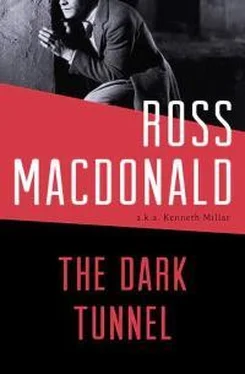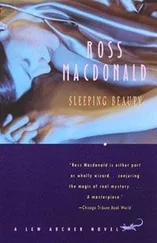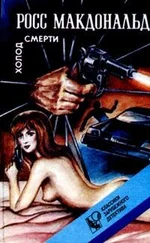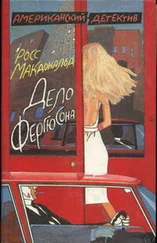Ross Macdonald
Originally published under the name Kenneth Millar
THE DARK TUNNEL
(I Die Slowly)
1944
PRIOR TO THE PUBLICATION of the first Lew Archer novel, The Moving Target, in 1949, Kenneth Millar (Ross Macdonald) published four excellent if not highly successful suspense novels under his own name. The Dark Tunnel was the first of these (the others, in succession, were Trouble Follows Me [1946], Blue City [1947], and The Three Roads [1948]). It was written when Millar was 28-years-old, while he pursued a doctorate in English at the University of Michigan, and it was initially published by Dodd, Mead & Company in 1944, as part of their Red Badge mystery line.
Neither The Dark Tunnel nor any of the other three early novels involves the exploits of a Chandleresque (or, more properly, Macdonaldesque) private investigator, although their style may be termed hard-boiled and is in the same general vein as the later work featuring Lew Archer. Both The Dark Tunnel and Trouble Follows Me, in fact, are novels of homefront espionage during World War II: the plot of each, like a great many suspense stories of the period, is concerned with the activities of Nazi spies and saboteurs in the United States and Canada. Each also deals with other matters, including relevant social and psychological issues; even in the embryonic stages of his career, Millar/Macdonald was much too accomplished a writer to limit his material to a single melodramatic focus.
When The Dark Tunnel first appeared it was hailed by many critics as the debut of an important new novelist in the suspense field. The Boston Globe called it “breath-taking,” the New Republic said it was “a humdinger,” the New York Times described it as “a thrilling story told with consummate skill.” Book reviewers are prone to overuse – and misuse – such superlatives, but in this case the praise is justified. Few first novels of any type are as polished, professional, and powerful as this one.
Those readers familiar with Millar/Macdonald’s writing only through the chronicles of Lew Archer will perhaps be surprised by The Dark Tunnel. The Archer novels, although rapidly paced, are crafted as the measured unraveling of events through dialogue, psychological insight, and detective work, while the emphasis here is on fast and furious action. The first few chapters may seem to belie this claim, and may strike the reader as vintage Macdonald in their handling, but these chapters are meant to be momentum-builders: they start the novel rolling. When it gathers sufficient momentum it begins to hurtle toward its climax without slowing up; indeed, it continues to pick up speed as it plunges ahead. Anyone who enjoy what publishers of today like to call “page-turners” will be more than satisfied for this reason alone.
Other qualities for which Ross Macdonald has been widely praised – sensitive characterization, wry humor, superior dialogue – are all in evidence here. The style, as noted above, is hard-boiled in that it utilizes the kind of detached realism that Joseph T. Shaw pioneered in the pages of Black Mask and that Chandler and Hammett refined and made famous. But Millar/Macdonald also refined it in his own way, beginning with this first novel, by adding elements of the literary, the scholarly, the lyrical. This unique admixture, as any aficionado of Lew Archer knows, includes a liberal seasoning of similes and metaphors; those in The Dark Tunnel are often as evocative and inventive as the ones which appear in later works. For example:
The stars fell down and rattled at the bottom of the sky and the night put on shabby brown clothes.
Then came a company of goose-stepping soldiers in army uniform, kicking out stiffly in unison as if they were all angry at the same thing and to the same degree. I had a grotesque vision of radio-controlled robots in field grey, marching across a battlefield toward smoking guns on pointed toes like ballet dancers and bleeding black oil when they fell down dead.
… the darkness swelled and contracted around me like black blood in an artery.
Wild ideas rushed through my mind like leering mimics of truth.
Now I could see only the dim outlines of the room, the walls which seemed more distant than before, the pale ridge my legs made under the sheet, the dark roses beside the window. I lay and watched the black mass of the roses, red in the sun and black at night like blood, rich and delicate to the touch like a loved woman, drowsy and dark like sleep and death.
The novel’s central premise is simple enough and can be summarized in a paragraph. Alec Judd, head of the War Board at “Midwestern University” in Arbana, confides in his friend, Dr. Robert Branch (the narrator), an English professor, that he suspects one of the Board members of being a Nazi spy. The man he suspects is Dr. Herman Schneider, head of the school’s German Department for the past several years, who ostensibly fled the Hitler regime in 1935. Schneider’s son, Peter, also comes under suspicion; as does Ruth Von Esch, an actress whom Branch met and fell in love with during a trip to Germany in 1937, and who comes to Arbana after a mysterious six-year disappearance. An alleged suicide, two attempts on his own life, and a savage murder for which he is framed plunge Branch into a series of nightmarish chases that lead from Arbana to Detroit and finally to a harrowing climax in a remote section of Canada.
This capsule plot summary, however, does little justice to what is a novel of ambition and complexity. And only hints at its virtues, which also include a pair of ingenious murder methods, one of which succeeds and one of which doesn’t; a well-portrayed academic background enhanced by a variety of erudite references; and, most important, an expert blending of disparate thematic material.
In the Lew Archer series, one of Macdonald’s obsessive themes is the loss of something or someone in an individual’s past and his quest to recapture it or its meaning – what Macdonald, in his chapbook On Crime Writing (1973), refers to as “exile and half-recovery and partial return.” Branch’s relationship with Ruth Von Esch is just such a case. Social and psychological issues also play major roles; one of these, in fact, encompasses the novel’s primary plot twist. To mention it here would be to give away the twist and spoil some of the considerable suspense; suffice it to say that it was shocking for its time and no doubt caused a stir in certain circles. ( The Dark Tunnel ’s first paperback publisher, the long-extinct Lion Books, was not nearly so circumspect when they reprinted it in 1950. Their first edition’s cover blurbs revealed the surprise ending with sensationalistic relish, in an obvious effort to entice newsstand book buyers. Those readers who bought it expecting lurid sensationalism had to have been disappointed; its treatment of controversial subject matter is, for the most part, restrained.)
The oppression and brutality of the Nazi war machine is the main focus of The Dark Tunnel. And yet the book is not prowar, as many novels with similar themes were during the early 1940s; rather, the statement it makes is an unusual and subtle blend of patriotism and pacifism. Millar advocates the defeat of the Axis powers not so much because they pose a threat to democracy or any other political ideology, as because fascism (or any other extremism) is a dangerous social disease, a form of madness that threatens the survival and well-being of the world’s population. There is no flag-waving or inflammatory propaganda in these pages, no careless racial slurs, no talk of annihilating Germany or Japan or any other nation of the interest of an ongoing peace. Millar’s concern is people, not politics; an emergence from the dark tunnel of war, where melodrama is the norm and insanity runs rampant, into the light of reason and compassion. The flashback scenes which take place in Nazi Germany in the late 1930s are particularly effective in the dramatization of these thematic views.
Читать дальше







